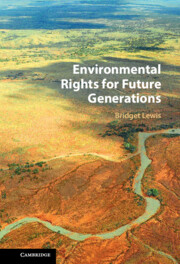Book contents
- Environmental Rights for Future Generations
- Environmental Rights for Future Generations
- Copyright page
- Dedication
- Contents
- Table of Cases
- Table of International Conventions
- Abbreviations
- 1 Introduction
- 2 The Rationale
- 3 The Law
- 4 The Problem
- 5 New Theory and Practice
- 6 Unconventional Natural Resource Extraction
- 7 Climate Adaptation, Decarbonisation and Geoengineering
- 8 Nuclear Energy
- 9 Conclusion
- Bibliography
- Index
4 - The Problem
Published online by Cambridge University Press: 11 October 2025
- Environmental Rights for Future Generations
- Environmental Rights for Future Generations
- Copyright page
- Dedication
- Contents
- Table of Cases
- Table of International Conventions
- Abbreviations
- 1 Introduction
- 2 The Rationale
- 3 The Law
- 4 The Problem
- 5 New Theory and Practice
- 6 Unconventional Natural Resource Extraction
- 7 Climate Adaptation, Decarbonisation and Geoengineering
- 8 Nuclear Energy
- 9 Conclusion
- Bibliography
- Index
Summary
Chapter 4 unpacks the reasons why international human rights is currently incapable of adequately protecting the environmental rights of future generations. It begins by explaining that future generations are not legally recognised as people who possess human rights and governments are not obliged to protect them. Even if those rights were recognised, there are no clear pathways for enforcing them. As the chapter explains, international human rights violations can be litigated by ‘victims’, who are people directly affected by an actual or imminent violation. The law does not allow for legal claims on behalf of people who do not yet exist or for harms that have not yet occurred or are not imminent, even though they may be foreseeable. Without standing to bring a legal action, the rights of future generations cannot be litigated and enforced within international human rights bodies. Additional challenges exist in relation to proving a breach of the law and establishing a causal connection when the alleged harm has yet to occur. Finally, the chapter explains the difficult task of balancing competing human rights interests and obligations across generations. After outlining these numerous challenges, the following chapter will offer a possible way forward.
Keywords
Information
- Type
- Chapter
- Information
- Environmental Rights for Future Generations , pp. 60 - 91Publisher: Cambridge University PressPrint publication year: 2025
Accessibility standard: WCAG 2.2 AAA
Why this information is here
This section outlines the accessibility features of this content - including support for screen readers, full keyboard navigation and high-contrast display options. This may not be relevant for you.Accessibility Information
Content Navigation
Allows you to navigate directly to chapters, sections, or non‐text items through a linked table of contents, reducing the need for extensive scrolling.
Provides an interactive index, letting you go straight to where a term or subject appears in the text without manual searching.
Reading Order & Textual Equivalents
You will encounter all content (including footnotes, captions, etc.) in a clear, sequential flow, making it easier to follow with assistive tools like screen readers.
You get concise descriptions (for images, charts, or media clips), ensuring you do not miss crucial information when visual or audio elements are not accessible.
Visual Accessibility
You will still understand key ideas or prompts without relying solely on colour, which is especially helpful if you have colour vision deficiencies.
You benefit from high‐contrast text, which improves legibility if you have low vision or if you are reading in less‐than‐ideal lighting conditions.
